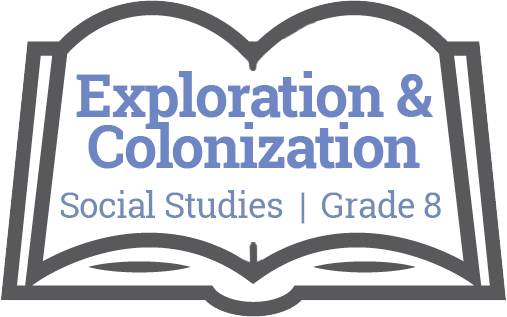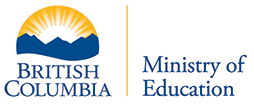
Unit Plan: Exploration & Colonization
Social Studies / Grade 8

Big Ideas
Exploration, expansion, and colonization had varying consequences for different peoples.
Concepts:
- Exploration
- Colonization
- First contact
Essential Questions
Students will keep considering…
- How do conflicting ideas affect progress?
- What makes one culture seem more appealing than another?
Evaluative Criteria
Teacher Evaluative Criteria:
Geography extension/ mapping skills: Students create (3D model, online, or draw) the island, including natural resources found on it, geographic location in relation to other landmarks, location of settlement, etc.
Rubric:
Differentiation:
Adaptations:
> Students present one part of the project (oral debate OR written report)
> Written report is submitted in alternative form (drawing or mind map)
Evaluation:
Develop rubrics to assess this project. Suggested evaluation branches: oral debate, policy proposal, realistic suggestions for compromise between two communities.
Extension:
Quiz evaluation: can be open book and based on big ideas/ essential questions (synthesis) rather than fact-based recall.
Paragraph writing:
Scaffold assessment with feedback on thesis statements, paragraph outlines, practice arguments.
Possibilities for paragraph expansion:
> Peer review paragraphs
> Create rubric with students; have students self-assess
Possibilities for project expansion:
> Study culture of indigenous groups around the world (e.g. music, food, religious traditions, etc.)
> Have students create map of the world during age of exploration to show specific information. E.g. natural resources, migration patterns, languages, etc.
Project evaluation:
Develop rubric to assess research skills (quality of sources, bibliography), presentation skills, information found (accuracy, relevancy).
Monitoring Progress
Teacher will monitor progress:
Teachers can monitor progress through ongoing formative assessment including but not limited to:
> Note-taking (extracting big idea from text)
> Primary source analysis
> Group discussions
> Optional assignments: journal entries, etc
Potential Student Misunderstandings:
N/A
Resources
WEBSITES
- Age of Exploration Handout
- Peoples of BC Map
- HBC Teaching resources
- National Humanities Centre
- Nova Scotia Digital Collections
- Newfoundand Heritage
PRIMARY SOURCES
BOOKS
- Pathways by Michael Cranny
- Crossroads: A Meeting of Nations by Michael Cranny
- Weslandia by Paul Fleischman
- Raven Steals the Light by Bill Reid
OTHER
Reflection
How will teachers and their students reflect on and evaluate the completed project?
Constant feedback from students and dialogue after each activity outlined in the Learning Events will help to direct and adapt what is explored in the next activity. Self, peer and teacher evaluation of the Performance Task and its alignment with the essential questions.
Teacher:
Next time I teach this unit I would…
Allow students to select the short stories that link to Identity.
Student:
My students needed:
Process:
Product:
Content:
Potential Student Misunderstanding:
Downloads
Unit Overview
Subject
Social Studies
Topic
Exploration and Colonization
Unit Overview
This unit analyses the role exploration and colonization played in settling North America. It address concepts of exploration, colonization, contact and differing ways of life through studies of European exploration of North America. Students will learn about North America’s first peoples and how their traditional practices changed with European expansion. Students will consider how past actions affect present international relations and how these transcending concepts could play a role in the 21st Century world.
Grade
8
Unit Duration
25 classes
Related Big Ideas
English Language Arts: 8
Recognize how language constructs personal, social, and cultural identity.
Texts are socially, culturally, and historically constructed.
Core French: 8
Creative works allow us to experience culture in an authentic way.
Arts: 8
A variety of national and international works of art and artistic traditions from diverse cultures, communities, times, and places.

The following resources are made available through the British Columbia Ministry of Education. For more information, please visit BC’s New Curriculum.
Big Ideas
The Big Ideas consist of generalizations and principles and the key concepts important in an area of learning. The Big Ideas represent what students will understand at the completion of the curriculum for their grade. They are intended to endure beyond a single grade and contribute to future understanding.
Core Competencies
 Communications Competency
Communications Competency
The set of abilities that students use to impart and exchange information, experiences and ideas, to explore the world around them, and to understand and effectively engage in the use of digital media
 Thinking Competency
Thinking Competency
The knowledge, skills and processes we associate with intellectual development
 Social Competency
Social Competency
The set of abilities that relate to students’ identity in the world, both as individuals and as members of their community and society
Curricular Competencies & Content
Curricular Competencies are the skills, strategies, and processes that students develop over time. They reflect the “Do” in the Know-Do-Understand model of curriculum. The Curricular Competencies are built on the thinking, communicating, and personal and social competencies relevant to disciplines that make up an area of learning.
Additional Resources
First People's Principles of Learning
To read more about First People’s Principles of Learning, please click here.
For classroom resources, please visit the First Nations Education Steering Committee.
